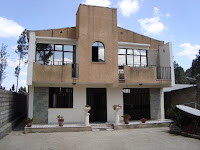Bert Ballard is himself an adoptee. In April of 1975, during the chaotic last few weeks of the war in Vietnam, the United States government sponsored an evacuation of some 3,000 orphaned and displaced children from Saigon and placed them with adoptive families overseas. The evacuation, which came to be known as Operation Babylift, has been regarded both as a great humanitarian response to the crisis and a bungled effort that amounted to kidnapping. While most of the children were, indeed, orphans in need of homes, as many as 20 percent still had parents in Vietnam.
Bert Ballard was one of the children on those planes. I first met him in 2005, as I was conducting research for a book about Operation Babylift. As I had discovered, Operation Babylift adoptees have varying levels of information about their pasts. Some know, for example, their place of birth. Others have birth certificates, records of hospital stays, or documentation from the orphanages that cared for them. Bert Ballard has none of these. His Vietnamese name, Vu Tien Do II, doesn't even make sense in Vietnam, which has no tradition of naming children "Junior," or "the Second," or "the Third."
Soon after Bert's adoptive parents took him into their home in 1975, they asked for an explanation for the "II" at the end of their new son's name. The adoption facilitator offered an answer that reveals the disorganization of the entire effort. One baby, who had been given the name Vu Tien Do, somehow got lost. A different baby--who would later become Bert--was discovered and given the lost child's name. When the original Vu Tien Do turned up, the adoption facilitators left both names intact, adding a "II" to the name of the boy who came second.
Despite the holes in his history, Bert Ballard considers himself fortunate. Loving parents raised him. He grew up in small-town America and received an excellent education. He's quick to admit, though, that his personal history has left him with a sense of loss. "I can remember as early as third grade, sitting in music class and everyone was talking about where they were born and I didn't have any answers for that."
As the trans-national adoptees of the '50s, '60s, and '70 mature, they have come to add new, and often heated, voices to the debate over the ethics of adoption. They do not, however, offer a unified perspective on the subject. While many adoptees express satisfaction about their upbringing, others see their adoption as a crime that tore them from their vulnerable birth families.
Ballard's view on the subject lies somewhere in between, and explains, in some ways, his own reason for adopting now. Although his awkward journey to the United States underscores the perils of mismanaged adoption, he also believes that children in need can benefit from the opportunity to be raised in loving homes. "I personally have difficulty with calls to end adoption in general," Ballard says, "because I feel that that ignores the broader social context of what's going on. Whether it's war, whether it's poverty, there's a reason that adoption occurs, and it's because families can't take care of their children." He does not think adoption should be a first choice, as seems to have been the case recently with a group of Haitian children, but he also disagrees with those who would summarily dismiss it as a viable option.
Even though the Ballards hope to travel this spring--35 years after Bert was himself airlifted out of Vietnam--they know that, in the complex world of international adoption, things almost never go as planned. In part because of Bert's own troubling experience as a child, the couple have worked to ensure that this adoption conforms to ethical standards. They recognize, too, that, though they believe the boy to be legitimately in need of a home, it's possible that a biological mother could appear over the next few months and ask to keep the child. Such an event would devastate the Ballards, who already consider the boy their son, but they also believe that the desires of biological parents take precedence. "I would fight for her rights," Sarah Ballard says, "as much as I would fight for my own."
As a boy, Bert Ballard sometimes dreamed of returning to his homeland, which seemed like a way to re-capture what he'd left behind. Now, as he plans to make his first journey back to Vietnam, he finds himself less focused on the past than on the future. "Now it's about going over and picking him up," Ballard says. "I want to have good, positive memories of when I picked up my son, memories of my whole family. It's not just about me."
